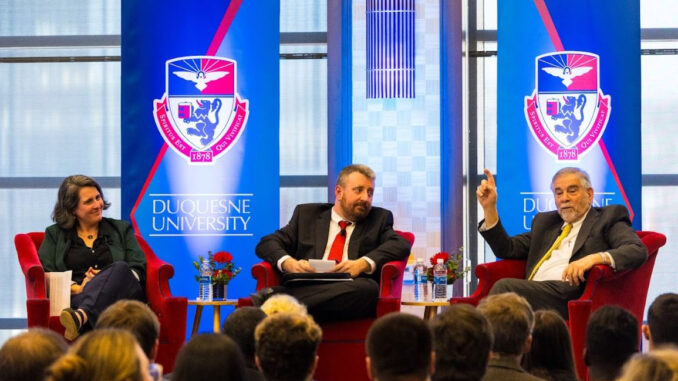
Eliyahu Gasson | Opinions Editor
Duquesne University hosted the sixth installment of its Civil Discourse series on Wednesday in the Power Center Ballroom.
The discussion, titled “The Holocaust, Pittsburgh Synagogue Shooting and Educating Future Generations,” focused on ways which people can and should discuss the topics of antisemitism and the Holocaust.
“I think [colleges and universities] have to create an atmosphere which is conducive to learning, but is willing to confront unsafe ideas and unsafe literature, unsafe philosophy, unsafe history,” Michael Berenbaum, professor of Jewish studies at American Jewish University in Los Angeles said to The Duke.
Aside from Berenbaum, featured speakers included Maggie Feinstein, Executive Director of the 10.27 Healing Partnership, a Pittsburgh based organization which provides support and resources to Pittsburghers impacted by the Tree of Life synagogue shooting in 2018. The event was moderated by Duquesne University history professor John Mitcham.
“The Holocaust was a catastrophe,” Berenbaum said during the panel, “and a catastrophe is different from a tragedy.”
Berenbaum evoked the words of Holocaust survivor and memoir writer Elie Wiesel.
“Wiesel in his own unique fashion said the Holocaust becomes a question,” Berenbaum said. “It’s a question of Western Civilization. How is it that a human being can love his wife and adore his children and go out in the morning and slaughter other people’s wives and children?”
To bring the discussion to Pittsburgh, Mitcham also asked the panelists about the Oct. 27, 2018 shooting at the Tree of Life synagogue in Pittsburgh’s Squirrel Hill neighborhood, committed by Baldwin resident Robert Bowers.
“The person who perpetrated that was a neighbor, he was somebody here in Pittsburgh,” Feinstein said. “Often with this question of ‘where does education and civil discourse come from and how does it play a role?’ Civil discourse has to be intragroup.”
Feinstein drew parallels to the shooting at Tree of Life to other national tragedies including the 2022 Buffalo shooting in which a lone gunman attacked shoppers at a Tops Friendly Market in Buffalo. She argued that discourse should start within the community affected by the tragedy.
“From the perspective of the victimized community, sometimes we stop being curious about each other,” Feinstein said. “We want the story to be so familiar that we forget that civil discourse actually has to start with the people right next to us.”
Feinstein also acknowledged the importance of including outside voices in discussion following tragedies. She said she never wants to overlook the importance of beginning the discussion with other members of the community.
Pertinent to the issue of civil discourse, the topic of educating new generations on the Holocaust was brought up. According to Mitcham, a poll conducted by The Economist found that 20% of Americans between the ages of 18 and 29 believe the Holocaust is a myth.
“I have a principle, which is I never appear on a panel with Holocaust deniers,” Berenbaum said.
“Not because I don’t think I can win, but because in a very basic way, if I appear on the panel, let’s assume 95% of people think that I want the debate, but 100% of the people can say the fact of the Holocaust is debatable. And that’s not the case.”
The panel discussion was followed by a Q&A lasting around 20 minutes. Audience members were encouraged to write questions for the panelists on index cards they received when they arrived at the event.
The panelists responded to the questions, connecting the Holocaust and anti-Semitism to the current conflict in Israel and Palestine and the way the issues are used to justify violence in the region. They also answered questions about reclaiming spaces which were the site of tragedies, referencing the construction of a memorial and museum of anti-Semitism at the site of the Tree of Life shooting.
The Q&A session was followed by a reception in the Power Center’s Shepperson Suite.
Katelyn Waranavge, a sophomore political science major at Duquesne, was present for the panel discussion.
“I think the idea of learning, to continue to learn, to have discourse, to be able to talk about topics like this that are so polarizing in our country are important,” Waranavage said.
Along with Duquesne students were visiting students from Washington & Jefferson College.
“There are a lot of tough topics that we need to take on, and I think discussion works,” said Michael Burke, a junior political science major from Washington & Jefferson.
Duquesne University president Ken Gormley started the Civil Discourse series when he took up the position in 2016.
“I thought it was a perfect mixture to combine both history and looking at the Holocaust with more recent events,” Gormley told The Duke. “Dealing with acts of hate to prepare our students and our academic community – to deal with the pain and the trauma of these events and to try to make something positive out of them.”

